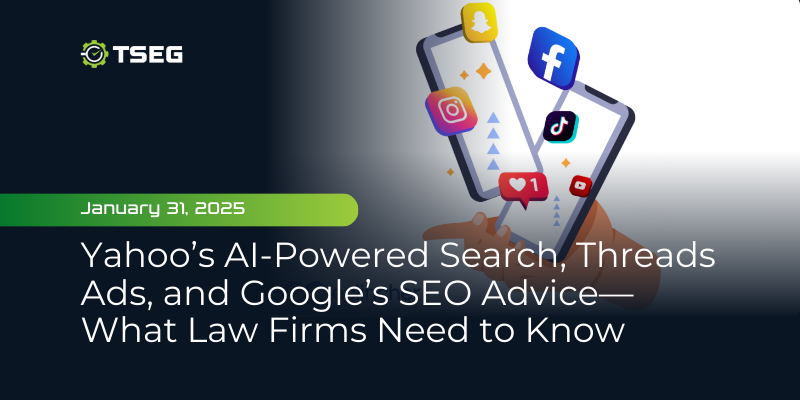Yahoo’s AI-Powered Search, Threads Ads, and Google’s SEO Advice—What Law Firms Need to Know
Posted on Friday, January 31st, 2025 at 3:44 pm
Big Shifts in Search and Social
The way people search for information and engage with content online is changing fast. Yahoo is testing an AI-powered search experience to keep up with Google and Bing, Meta is introducing ads on Threads to counter ads on X (formerly Twitter), and Google is offering rare insight into how AI-generated answers impact SEO. These developments could reshape how law firms attract potential clients in an increasingly competitive space.
Yahoo’s AI Search
Yahoo is making a comeback in search with AI-driven results, aiming to compete with Google and Bing. The company is testing an AI-powered search experience that provides chatbot-like answers, similar to Google’s AI Overviews and Microsoft’s Bing Chat. This upgrade could change how users interact with Yahoo’s search results and how law firms appear in this search engine.
For years, Yahoo has been an afterthought in the search market, but its return with AI features signals potential new ranking opportunities. If Yahoo gains traction, firms may need to optimize content for its AI-driven results in addition to Google’s. However, there’s also a risk—AI-generated answers could reduce organic traffic by providing direct responses instead of leading users to law firm websites.
For now, Yahoo’s AI search is in an experimental phase, but it’s a reminder that search competition isn’t static. Law firms should monitor its development and be ready to adjust SEO strategies if Yahoo re-establishes itself as a meaningful traffic source.

Threads Ads
Meta has officially launched ads on Threads, its social platform designed to compete with Twitter/X. This marks a key step in Meta’s effort to monetize Threads and attract advertisers. For law firms, this raises an important question: Is Threads worth adding to a marketing strategy?
The first wave of Threads ads is being integrated through Instagram’s existing ad system, meaning businesses that already run Instagram ads can extend their reach to Threads with minimal extra effort. This could be useful for firms already investing in social media marketing. However, Threads is still fairly new and advancing, and its audience skews younger compared to platforms like Facebook and LinkedIn, which tend to be stronger for legal advertising.
Law firms considering Threads ads should assess whether their target clients are active on the platform. For firms focused on business law, estate planning, or high-net-worth clients, LinkedIn or traditional search ads may remain more effective. But for those in consumer-facing areas like personal injury or criminal defense, Threads could be worth testing—especially if engagement grows.
Meta’s ad expansion on Threads is a reminder that social media platforms are constantly innovating new features. While it’s too soon to tell if Threads will become a major advertising channel, law firms should keep an eye on its growth and be ready to adapt if it proves valuable for client outreach.

Keeping Up With Search and Social Media
Yahoo’s AI search, Threads ads, and Google’s AI-driven SEO changes all point to one reality—online marketing is never static. For law firms, staying visible means keeping up with how search engines and social platforms deliver information to potential clients.
Yahoo’s return to AI-powered search could create new ranking opportunities, but it also moves search expectations toward chatbot-style answers that may reduce traditional website traffic. Meta’s Threads ads offer another advertising option, but firms need to determine whether the platform’s audience aligns with their ideal clients. Lastly, Google’s AI Overviews reinforce the importance of well-structured, authoritative content to maintain search rankings.
There’s no one-size-fits-all strategy, but firms that regularly assess their online marketing approach and adjust to these changes will be in a stronger position. Whether that means testing new ad platforms, refining SEO strategies, or diversifying marketing efforts, the firms that adapt will be the ones that continue to attract clients. Contact TSEG for more info.
